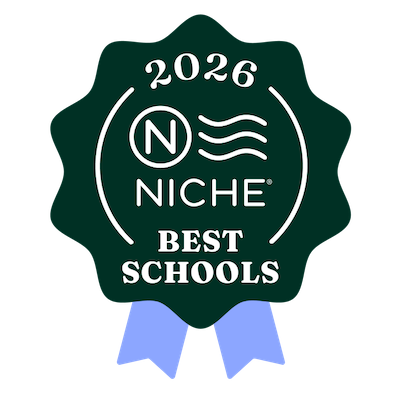Search
Curriculum Detail
Explore our Curriculum
Modern Language
Language is a means of communication among people and a reflection of culture. Students who learn how to communicate in a foreign language develop an appreciation of the culture and its literary heritage and increase their awareness and acceptance of others. Students acquire a life-long skill in an age when global communication is imperative.
Languages currently offered are Chinese, French, Italian, and Spanish.
Languages currently offered are Chinese, French, Italian, and Spanish.
Because younger students learn a language and its pronunciation with greater ease, foreign language learning should begin as early as possible and continue through the upper levels. Introductory courses are conducted in the target language as much as possible, and subsequent levels are conducted almost exclusively in the target language. Most colleges expect that students will have studied a minimum of three years of one language in high school. Although three consecutive years of study is the modern language requirement in high school, four years of study are recommended to fully enhance students’ linguistic and cultural competency. Hopkins offers modern languages in Grades 7 through 12, and we encourage our 7th and 8th Grade students to take Chinese, French, or Spanish, in addition to their required Latin course. New 8th Grade students may choose to take any modern language, including Italian, in lieu of the Latin requirement. Upon successful completion of Chinese 1B, French 1B, or Spanish 1B, or Italian 1 (for new students in Grade 8), students are qualified to take Chinese 2, Spanish 2, French 2, or Italian 2 in Grade 9. All students wishing to accelerate must receive departmental approval.
Modern language learning involves the use of all linguistic skills — listening, speaking, reading, and writing — as well as cultural competence. Students develop fluency and proficiency in communication
Modern language learning involves the use of all linguistic skills — listening, speaking, reading, and writing — as well as cultural competence. Students develop fluency and proficiency in communication
through the equal emphasis of these skills. All students benefit from classroom and home use of audio and video materials in the target languages, and they enjoy task-based learning in the target language from the earliest levels. Each class also has a designated time in the language lab. Our language lab gives students even further opportunities to interact in the target language, such as dedicated time communicating with students in our sister schools abroad. Modern Language students memorize and recite poetry, and selected students participate in the annual Connecticut state poetry contest. Students have the opportunity to take the national language exams and, in the upper levels, the Advanced Placement®examinations. Trips abroad to China, France, Guatemala, and Italy, with homestays and visits to our sister schools, are offered to provide a global perspective for students outside of the classroom.
A minimum of three credits of study in one language is required for graduation. The credits must be earned in three consecutive years in Grades 9 through 12.
Our Faculty
-
Lan LinModern Language Department Chair (Chinese)203.397.1001 x690Southern Connecticut State University - M.S.
Wuhan University - M.D. -
Carl AtleeModern Language (Spanish) / Academic Support203-397-1001 x682Trinity University - B.A.
University of Arizona - M.A.
University of Arizona - Ph.D. -
Alvaro CerqueiraModern Language (Spanish)203.397.1001 x561Middlebury College - B.A.
University of Pennsylvania - M.S.Ed. -
Marie DovalModern Language (Spanish)203.397.1001 x772Washington University - B.A.
-
Sarah du PlessisModern Language (French), SAT & ACT Test Coordinator203.397.1001 x734Radford University - B.A. & M.S
Virginia Tech - Ph.D. -
Gabriela GerstenfeldModern Language (Spanish)203.397.1001 x793Universidad de la Republica (Uruguay), Facultad de Arquitectura - M.Arch.
-
Qi LiModern Language (Chinese)203.397.1001 x771Shandong Teachers’ University (China) - B.A.
Shandong University (China) - M.A.
University of Bridgeport - M.S. -
 Maddalena Lolaico
Maddalena Lolaico -
John LytleModern Language (French) / Academic Support203.397.1001 x782The College of Wooster - B.A.
Yale University - M.A.
Yale University - M.Phil.
Yale University - Ph.D. -
Anabelle Marty JoseExecutive Director of Pathfinder / Modern Language (Spanish)203.397.1001 x350Yale University - B.A.
Johns Hopkins University School of Education - M.S. -
-
 Elena Pellus PerezTeacherUniversity of Alicante - Master of Arts
Elena Pellus PerezTeacherUniversity of Alicante - Master of Arts
Yale University - MPhil, MA
Yale University - PhD -
 Ran RanModern Language (Chinese)203-397-1001 x650Beijing Institute of Civil Engineering and Architecture - B.A.
Ran RanModern Language (Chinese)203-397-1001 x650Beijing Institute of Civil Engineering and Architecture - B.A.
University of Surrey - M.S. -
Naomi SenzerModern Language (French)203.397.1001 x616University of North Carolina - BA
Yale University - MM

Hopkins is a private middle school and high school for grades 7-12. Located on a campus overlooking New Haven, CT, the School takes pride in its intellectually curious students as well as its dedicated faculty and staff.
Hopkins School admits students of any race, color, national and ethnic origin to all the rights, privileges, programs, and activities generally accorded or made available to students at the school. It does not discriminate on the basis of race, color, national and ethnic origin in administration of its educational policies, admissions policies, scholarship and loan programs, and athletic and other school-administered programs.













